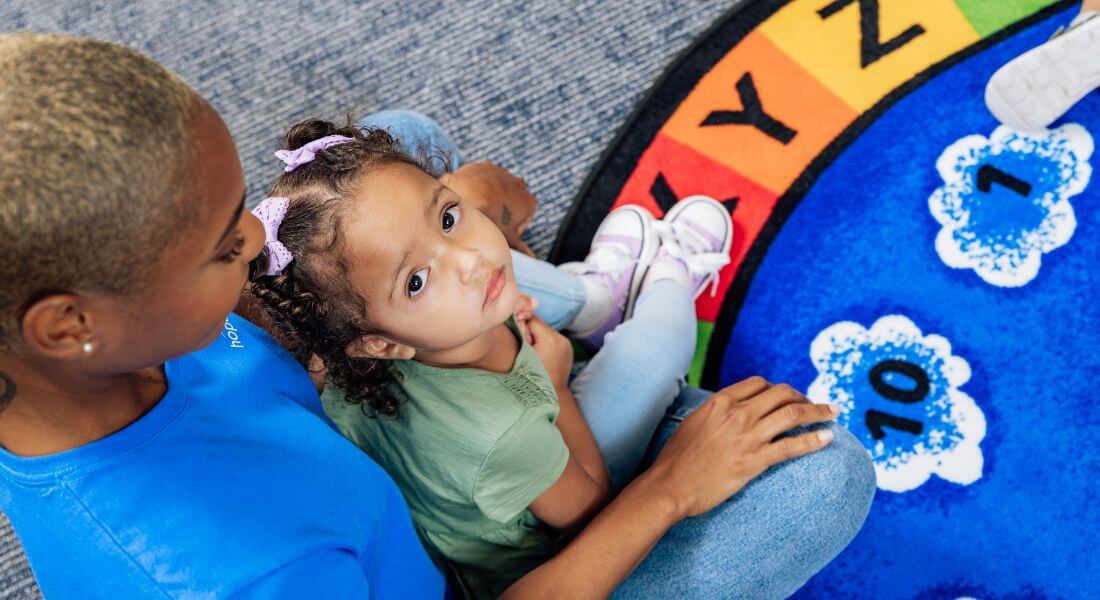Common Misconceptions About Autism
April 02, 2025
April 02, 2025

Autism is becoming a little more understood among the general population, thanks in part to the rise of neurodiversity in the media, like “As We See It” and “The Good Doctor,” “Sesame Street” and “Carl the Collector.” Increased exposure within the media expands awareness and respect for autism spectrum disorder (ASD), but its portrayal can also raise a lot of questions and assumptions.
We cover the definition of autism is and what it means to our Hopebridge community on our “What is Autism?” page, but we know the education doesn’t end there. It’s also important to understand what ASD is not. For this, we turned to Hopebridge Vice President of Quality Melissa Chevalier to discuss some of the most common misconceptions connected to autism.
… the same for everyone.
The mindsets about autism are often ditch to ditch, and people who have it tend to get bucketed in one extreme or the other. Using that thought process gets us far from the truth. Autism is not just one thing; it is a spectrum. These are individuals who have their own unique personalities, characteristics, capabilities and preferences. Autism affects each person in different ways and in varying levels. You may have a cousin with autism who doesn’t care for hugs, flaps his hands when excited, and has a knack for sports statistics, but that doesn’t mean another neurodiverse individual will experience the same challenges and successes.
… an illness.
Autism is not a disease that can (or even should) be cured. It is a neurodevelopmental disorder. More simply put, autism is a difference in the way a person’s brain works. At Hopebridge, we offer a range of therapies like applied behavior analysis (ABA therapy), speech therapy and occupational therapy to support children and families, but our services are not aimed at “recovery” nor making a person any less autistic. Instead, these therapies can assist children with independence and challenges associated with some of the symptoms of autism through coping strategies, accommodations and skill development.
… indicative of exceptional intellectual or artistic abilities.
This is the side that is often highlighted in fictional stories. You’ve seen it: a genius who just seems a little “socially awkward.” Yes, there absolutely are incredible scientists, artists, musicians, mathematicians, directors, comedians and individuals with other skills and talents who have autism. Yet it is misguided to think that autism in itself leads to extreme intelligence or out-of-this-world creativity.
… lower intelligence.
On the other hand, it is also a myth that children with autism are not as smart as their peers. There are limitations – sometimes many of them – but again, autism is not directly linked to intelligence. People with ASD often learn differently and may take a little longer to catch on in some areas (e.g. social cues), but they may also excel in other areas. It doesn’t mean they understand less or have a lower IQ. This fact extends to those who cannot talk, as well as others who need assistance using the restroom, so it is important not to be quick to judge.
… uncommunicative.
Many times, if people don’t hear someone vocally talking, they assume that person cannot communicate at all. With autism and other developmental disabilities, this is not the case, even though some individuals may not speak. ASD is not equivalent to deafness, and it doesn’t mean someone lacks thoughts to share with others. Sometimes the thoughts are processed; verbalizing them is just difficult. Thanks to therapies, assistive technologies and tools like the Picture Exchange Communication System (PECS), children with autism are increasingly able to communicate, even if their voices are not heard out loud.
… a lack of emotion or desire for relationships.
Because of some of the associated communication and behavioral challenges, it may seem as if people with autism aren’t interested in others’ feelings or even have their own. This is incorrect. It’s true that autistic individuals may not always detect body language or read between the lines (e.g. sarcasm), but the emotions are there. They feel happiness, sadness, empathy and everything in between. Words might affect them differently and they may require assistance through more direct, verbal cues. When they do pick up on the signs, they may not express sympathy or affection in the manner most people expect, but it does not mean their response is not heartfelt.
… unsuccessful.
Some of the general public may conclude that children with autism will never be as successful as someone who is neurotypical, or that those who are non-speaking will not be able to experience accomplishments like those who communicate verbally. Again, not true. Many autistic students graduate high school, go to college and get jobs, just like the typical “American Dream.” Others achieve success in different ways that should also be applauded: living by themselves as adults, winning a swim meet, independently caring for a pet, or saying “mom” for the first time at 9 years old. Seemingly small wins can make a huge impact.
Dream.” Others achieve success in different ways that should also be applauded: living by themselves as adults, winning a swim meet, independently caring for a pet, or saying “mom” for the first time at 9 years old. Seemingly small wins can make a huge impact.
… something to fear.
It is not uncommon for families to initially feel anxious about an autism diagnosis. Admittedly, this is new territory for many, along with extra worries that come with it. We do not discredit these natural feelings, but this diagnosis is the beginning of a new journey. Autism acceptance can be challenging for some, but it is something to understand and embrace. Autism can open our eyes to view the world in a different light, and our kids can do some amazing things. ASD shouldn’t be feared. Speaking isn’t the end-all, be-all either. Nor is tying one’s shoes, giving eye contact or any other behavior someone with autism might – or might not – experience. Thankfully the diagnosis has a different meaning today than it did when we opened Hopebridge, thanks to the advancements and resources available. There are more opportunities, therapies, technologies and support resources for families. Most of all, there are welcoming communities, like the one we built at Hopebridge.
This list of misconceptions – and flat-out falsehoods – could go on and on, just like the definition of autism. Autism awareness and autism advocacy are just as important as ever. To learn even more about ASD, check out our Hopebridge blog, which includes information on support resources available for families and how to get involved in the community.
If you are interested in autism testing, ABA therapy or other autism services for your child, connect with us online to get started at one of our centers around the nation.
Parenting Resources
September 24, 2019
10 Easy Sensory Activities for Children with Autism
Autism Therapy
February 13, 2019
'Good Day Live' on the Importance of Early Intervention for Children with Autism
Hopebridge in the News
May 30, 2019
Hopebridge Expands Across Atlanta with Five Additional Pediatric Autism Therapy Centers